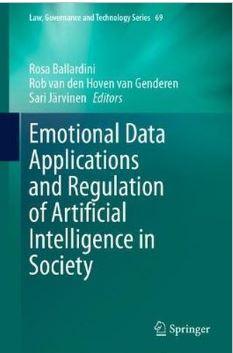Springer International
Emotional Data Applications and Regulation of Artificial Intelligence in Society
Emotional Data Applications and Regulation of Artificial Intelligence in Society
Couldn't load pickup availability
Edited by: Rosa Ballardini, Rob van den Hoven van Genderen, Sari Jarvinen
This revolutionary new book on using AI to process human emotion data seeks to raise awareness for the topic, thoroughly discuss it from a multidisciplinary perspective and, by doing so, disseminate research findings that elaborate on the current and future regulatory needs for the responsible and ethical development and application of emotional AI.
Biometric and psychological data of humans are the most sensitive data on human behavior. The book's objective is to provide a holistic understanding of key challenges and propose novel, workable, substantive and methodological solutions for navigating current and future legal and ethical needs and dilemmas regarding the processes of developing and using emotional AI.
Although both the academic community and political decision-makers continue to intensively discuss issues in the ethical regulation of AI, there is still a very limited understanding of both the opportunities and the risks in connection with emotional AI specifically. Yet, emotional AI is one of the most promising areas of AI developments and applications. Several of these innovations could be a welcome change in our society, as they could improve our well-being in various ways.
That being said, these inventions require considerable investments. Thus, legal incentives such as IPRs are crucial to supporting investment in these fields. Further, these innovations might have negative effects on the privacy and autonomy of natural persons, raising both legal and ethical concerns. Thus, their legal and ethical acceptability, as well as their societal acceptance, might be challenged by several legal provisions in the EU, such as the GDPR; regulations on communications, social platforms, and marketing; and the draft AI Act. Yet, the current legal landscape for emotional AI in Europe is anything but clear - an aspect that becomes even more apparent when we consider the global picture of the regulatory framework for emotional AI.
In this book, a diverse team of internationally respected experts addresses these issues, engaging in a multidisciplinary study into techno-economic-legal developments concerning emotional AI, its impacts, and the need for action. The book offers in-depth scientific and societally relevant insights on the past, present and future of AI in general, especially its many implications for law and policy. Although the primary target audience for the book are academics from the field of law, the book also offers sound guidance for legislators and general policymakers, as well as companies and organizations.
Subjects:
IT, Internet and Artificial Intelligence Law
Contents:
Introduction
Part I: Technology and Busines
Adding emotional intelligence to physical spaces - data-driven solutions for measuring, analyzing and responding to user needs and expectations
Research challenges along the data analysis chain of personal data
Trustable AI - Explanation of decisions of AI tools for better acceptance by the users
Part II: Law and Ethics for and with emotional AI
Artificial Intelligence, Threat or Enhancement of the Quality of our Wellbeing and Personal Life?
Cry me a river: The classification and protection of emotional data under the GDPR
Personal data protection in emotional AI: the facial coding example
Consenting to use of emotional data by AI-based services
A Duty of Loyalty for Emotion Data
Talking to strangers. On people-machine communication and the automated detection of online solicitation of children
AI in the lecture room - Analysing two use cases in the context of higher education
Fair and sustainable data governance for responsible uses of emotional AI
Emotional AI and the consensus-based remuneration regime in Southeast Asia
Damage caused by Emotional AI - Do existing and prospecting liability rules provide with sufficient protection?
Commercializing emotions in a lawful and responsible manner - The limitations, possibilities and dilemmas in an emotional AI service business concept in the workplace
Design science methodology for AI-based contract design
LinkedIn Links for Authors:
Relevant International Organizations & Institutions:
- European Data Protection Board (EDPB)
- Future of Life Institute
- AI Now Institute
- OECD AI Policy Observatory
- World Economic Forum – AI & Machine Learning
Keywords:
emotional AI, artificial intelligence regulation, biometric data, ethical AI, GDPR compliance
Target Audience:
academics in law, policymakers, AI researchers, business professionals, tech industry leaders
Genre:
technology law, artificial intelligence, data protection, ethics & society, business & innovation
Tags:
Artificial Intelligence, Emotional AI, Ethical AI, GDPR, AI Regulation, Tech Law, Data Privacy, AI Applications, Business Innovation, AI and Society


